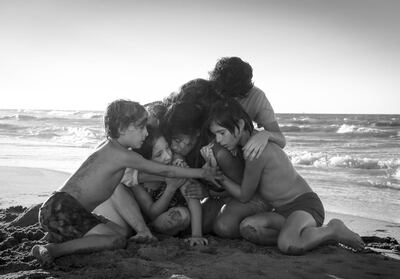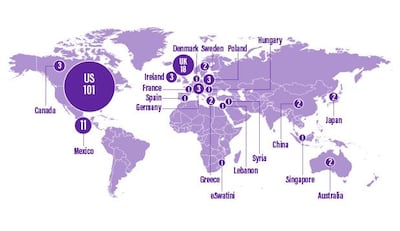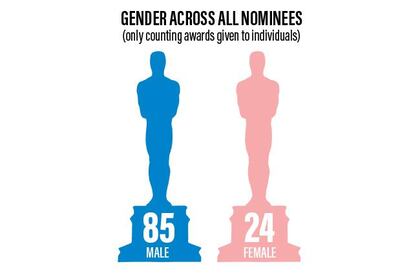This year's Oscar nominations are in and, as predicted, Roma and The Favourite lead the pack with 10 nominations apiece, including the coveted Best Picture and Best Director for both.
But what else can we learn from this year’s crop of award challengers?
We've dug deep into the demographics of all 150 of this year's nominated films and individual nominees. From the stars and the directors to the script writers, musicians and technicians, if they've been nominated, they're in our figures — and while many of the results may be fairly predictable, there are a few surprises too.
#OscarsSoAmerican: the English speaking world dominates
On a more general level, it’s no surprise that the US dominates the nominations. Of the 150 films or individuals that are nominated this year, 101 are American, or in the case of international co-productions or individuals of mixed nationality, have some American input.
Also unsurprisingly, English-speaking countries dominate the chasing pack, with the UK coming in second with 18 nominations, and Ireland and Canada tied for fourth on three apiece. Germany and Poland have also both managed three nominations this year.

Third place is perhaps less predictable – Mexico has 11 nominees. This is entirely down to Alfonso Cuaron's hotly tipped Roma, which picked up a total of 10 nominations across both technical and craft categories, tied for first place with The Favourite, and a total of 11 nominees for Mexico or Mexicans thanks to its Production Design duo Eugenio Caballero and Bárbara Enrı́quez.
Only two nominations out of 20 for black actors
Firstly, the Oscars may not be quite #OscarsSoWhite as in previous years, with Best Picture nominations for BlacKkKlansman, Green Book and Black Panther, and a debut Best Director nomination for Spike Lee for the former. But, there were only two nominations for black actors among the 20 nominees in the four acting categories (Mahershala Ali and Regina King). On the other hand, there was a welcome first for Hannah Beachler, who became the first African-American ever to be nominated for a Best Production Design Oscar, for Black Panther.
Female directors are still woefully under-represented
If the Oscars are slightly less white than in previous years, they’re certainly no less male. There are no female directors among the nominees for Best Director, and none of the Best Picture nominations were directed by a woman. Out of 109 individuals nominated across all 24 categories only 24 people, or 22 per cent, are women.
It's also noteworthy that these numbers are inflated by female presence in what could reasonably be termed "predictable" categories – all the nominees for Best Costume Design are women, for example, including two nominations for the British costume designer Sandy Powell for The Favourite and Mary Poppins Returns. It's an impressive achievement, but means the other categories are even less represented than the figures suggest.
What did make it from the rest of the world...
As well as Black Panther's sweeping success last year, 2018 was also the year that Asian cinema crossed into the mainstream with the success of Crazy Rich Asians. That film missed out on any Oscars nominations, but there was a Singaporean nominee nonetheless – First Man's sound editor Ai-Ling Lee picked up a nod in her category. Japan, meanwhile garnered two nominees – Mamoru Hosoda for his animated feature Mirai and Hirokazu Koreeda's Best Foreign Language Film nominee Shoplifters. China also picked up two nods – as a co-production country on animated short One Small Step, and courtesy of Chinese-American-Hungarian director Elizabeth Chai Vasarhelyi, who was nominated for her feature documentary Free Solo.
Closer to home, the big news was, of course, Nadine Labaki's Best Foreign Language Film nomination for Capernaum. There was further regional success for Syrian director Talal Derki, who was among the nominees for his doc Of Fathers and Sons.
The Favourite may have led the pack alongside Roma, but unlike that film, which thrust Alfonso Cuaron's native Mexico into the leading pack of nominated countries, The Favourite's 10 nominations only managed two nominations for director Yorgos Lanthimos' native Greece, for the director himself and for editor Yorgos Mavropsaridis.
The film itself was an Irish/UK/US co-production, while the other stars and technicians nominated were a mixture of British and American. Of Fathers and Sons director Talil Derki, incidentally, studied film in Athens, though sadly that doesn't help Greece's haul for our purposes.
A fun fact
Finally, the nomination for most surprising nomination must surely go to The Kingdom of eSwatini. If you’ve never heard of that, don’t feel too ashamed. It only came into existence last April, when King Mswati III of Swaziland announced he was renaming his country.
Richard E Grant, who is nominated for a Best Supporting Actor statue for his role in Can You Ever Forgive Me?, was born and grew up in Swaziland under its former name. Grant considers himself Swazi-British, and even wears two watches, one of which is permanently set to the time in his African homeland. Grant's nomination represents the first time he, eSwatini, or indeed Swaziland, have picked up an Oscar nomination, though he did previously bring the country its first Razzie nomination for his supporting role in 1991's Hudson Hawk.
*Methodology: Where prizes are given to a film, such as Best Picture or Best Foreign Language Film, homeland credit is given to the producing country, or co-producing countries, rather than the director, so The Favourite as Best Picture counts as a UK/Irish/US film despite its Greek director. Where the prize is given to a named individual, or individuals, such as Best Director or the documentary categories, credit is given to the country of their nationality, or countries in the case of mixed nationality. Hence, although Of Fathers and Sons is a German/Lebanese/Syrian co-production, because the prize is awarded directly to the director, for our figures the credit goes to Syria, since that is Talil Derki’s nationality.
The list of all nominations by country out of 161:
US 101
UK 18
Mexico 11
Ireland 3
Denmark 1
Syria 1
Lebanon 1
Singapore 1
Greece 2
Hungary 1
Poland 3
Spain 1
Germany 3
Japan 2
Canada 3
China 2
Australia 2
Sweden 2
France 1
Denmark 1
Kingdom of eSwatini 1
The gender split
Male nominees: 78 per cent
Female nominees: 22 per cent




